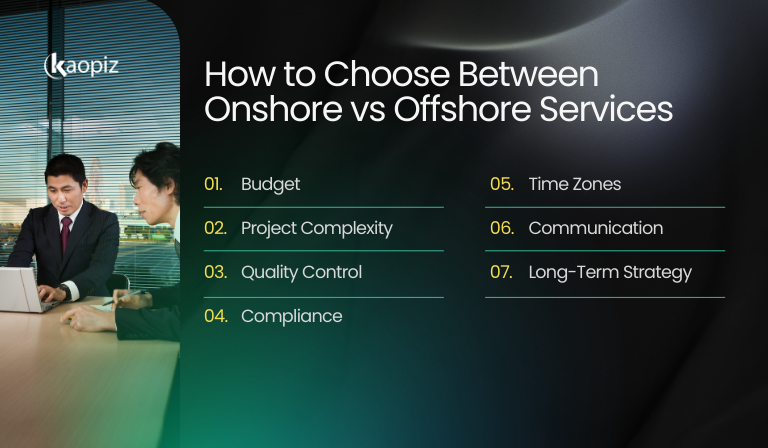Onshore vs Offshore: Which Is Right for Your Business in 2025?
As businesses face rising costs and growing demands for digital transformation, outsourcing remains a smart way to scale effectively. But one key question often arises: Should you outsource onshore or offshore?
Onshore outsourcing offers proximity and easier communication, while offshore outsourcing provides cost savings and access to global talent. In 2025, choosing the right model is more important than ever.
This blog breaks down the differences between onshore vs offshore, their pros and cons, and key factors to help you decide which model best fits your business needs. Scroll down to find out valuable insights you need to make the right call!
Table of Contents
- What Is Onshoring?
- What Is Offshoring?
- Advantages and Disadvantages of Onshore and Offshore Services
- Onshore vs Offshore: Key Differences to Consider
- How to Choose Between Onshore and Offshore Services
- Onshoring vs Offshoring: Which Is Right for You?
- Why Kaopiz Is a Trusted Offshore Development Partner?
- Conclusion
- FAQs
What Is Onshoring?
Onshoring, also known as domestic outsourcing, is the practice of contracting services to a third-party provider located within the same country as your business. Unlike offshoring, which involves working with overseas vendors, onshoring allows companies to leverage local talent, align with national regulations, and maintain closer communication with their outsourcing partner.

This model is especially popular among businesses that prioritize real-time collaboration, strong data protection laws, and cultural alignment over cost savings.
For example, a fintech company in Singapore hires a software development agency also based in Singapore to build a custom mobile banking app. Since both teams operate in the same time zone and regulatory environment, they can collaborate efficiently while ensuring compliance with Singapore’s Personal Data Protection Act (PDPA).
What Is Offshoring?
Offshoring refers to the practice of outsourcing business functions, such as software development, customer support, or IT operations, to a third-party provider located in another country. The primary goal of offshoring is to reduce operational costs while gaining access to a larger talent pool and specialized skills that may be scarce or expensive domestically.

According to Market.us, the market is projected to expand from $315.2 billion in 2023 to approximately $739.4 billion by 2033, registering a CAGR of 8.9% during the forecast period from 2024 to 2033. Some leading countries for offshore services are India, China, Philippines, Mexico, Poland, Brazil, Vietnam, etc., according to Statista.
One of the offshoring examples is that a Singaporean retail startup partners with a Vietnamese IT outsourcing company to build its e-commerce platform. This partnership allows the company to tap into global talent and expertise to strengthen its operations.
After exploring the onshore and offshore meanings, here is the key takeaway:
| Model | Definition |
|---|---|
| Onshore | Outsourcing to a service provider located in the same country as your business. |
| Offshore | Outsourcing to a service provider located in a different country, often overseas. |
Advantages and Disadvantages of Onshore and Offshore Services
Choosing between onshore vs offshore in business requires a clear understanding of what each model offers. Below, we break down the key advantages and disadvantages of both to help you make an informed decision.
Onshore Services: Pros & Cons
Onshore offers the benefit of working with partners in the same country, making it ideal for businesses that prioritize real-time collaboration, local compliance, and cultural alignment. However, it comes with trade-offs in terms of cost and scalability.
Here are the pros and cons of onshore services that you should consider:
| Pros | Cons |
|---|---|
| Same time zone and easier real-time collaboration | Higher labor and operational costs |
| No language or cultural barriers | Smaller local talent pool |
| Easier compliance with local laws and regulations | Limited scalability for large or fast-growing teams |
| Familiar business practices and expectations | Less flexibility in adjusting team size quickly |
Offshore Services: Pros & Cons
Offshore development advantages are cost savings and access to global expertise, making it an attractive option for businesses looking to scale efficiently. However, it also comes with certain operational and communication challenges that must be managed carefully.
Below is the table of the pros and cons of offshore services:
| Pros | Cons |
|---|---|
| Lower labor costs and significant cost savings | Time zone and communication challenges |
| Access to a wide global talent pool and specialized skills | Potential language and cultural barriers |
| Enhanced privacy and reduced reporting obligations | Offshore companies may face restrictions on local operations |
| High adaptability to diverse business environments | Longer time needed for onboarding and market research |
Onshore vs Offshore: Key Differences to Consider
After reviewing the definitions and considerations, the next step is to understand what is the difference between offshore and onshore. In this section, we provide a detailed comparison table followed by a breakdown of what sets these two types of outsourced services apart.
| Aspect | Onshore | Offshore |
|---|---|---|
| Location | Same country as your business | Different country, often overseas |
| Cost | High (local wages, taxes, infrastructure) | Low (affordable labor, tax advantages, reduced overhead) |
| Global Market Reach | Limited to domestic market | Access to new markets and global customers |
| Communication | Easy, real-time, culturally aligned | May face time zone, language, or cultural challenges |
| Business Continuity | Faster local response, stable environment | Depends on partner’s remote readiness and risk planning |
| Tax & Compliance | Simple – follows local laws and tax frameworks | Complex – must manage cross-border laws and reporting |
| Data Privacy | Clear national regulations | Requires strong safeguards and contracts for cross-border data |
| Talent Access | Limited talent pool; slower hiring | Large talent pool; fast, flexible team scaling |
| Customer Support | Easier, local language, culture, and expectations | More challenging, cost-effective, scalable, may require extra training |
| Payroll Management | Familiar with local labor laws and quick legal updates | Lower cost but more complex legal handling across jurisdictions |
| Scalability | Slower due to limited local resources | Faster team ramp-up and scaling flexibility |
Cost Comparison Onshore vs Offshore Software Development 2025
Cost is often the most decisive factor when comparing onshore vs offshore software development. Onshore services tend to be more expensive due to higher labor costs, infrastructure expenses, and fewer tax incentives. Even when partnering with providers in lower-cost regions of the same country, the savings are usually limited.
Offshore outsourcing, on the other hand, offers substantial cost advantages. By working with teams in countries like Vietnam, India, or the Philippines, businesses can reduce development costs by up to 60–70%. Lower wages, favorable exchange rates, and reduced overhead contribute to these savings.
For example, offshore software development cost in Vietnam typically ranges from $20–$40/hour, compared to $100/hour or more in countries like the U.S. or Singapore. This difference enables companies to reinvest in innovation, scale faster, or improve margins.
While cost shouldn’t be the only consideration, offshoring clearly leads when budget efficiency is a priority.
Globalization and Market Reach
Offshore outsourcing offers a strategic advantage for businesses aiming to grow globally. By partnering with service providers in other countries, companies can expand their presence, engage with new markets, and better serve international customers.

This global reach not only boosts brand visibility but also opens doors to local insights, talent, and consumer behavior in the target region. For example, a U.S.-based company outsourcing software development to Vietnam may gain a stronger understanding of the Southeast Asian market, positioning itself for regional expansion.
While onshore outsourcing keeps operations within national borders, it offers limited exposure to international growth opportunities. For businesses with global ambitions, offshoring provides a clear path to scale and market access.
Communication and Collaboration
When it comes to comparing onshore vs offshore team communication and collaboration, onshore outsourcing generally holds the advantage. Working with a team in the same time zone and cultural context simplifies project coordination.

In contrast, offshore outsourcing can pose challenges, even in regions where English proficiency is high. Accents, cultural nuances, and time zone differences can lead to occasional miscommunication or delays in collaboration.
That said, a professional offshore team can bridge these gaps effectively with strong project management, overlapping work hours, and a clear communication framework. For example, Kaopiz—an offshore development company based in Vietnam—successfully overcame such barriers in a project developing an AI-powered drone inspection system with Comsys Information Systems Co., Ltd. from Japan.
Business Continuity
Business continuity is about keeping operations running smoothly during disruptions and is a critical factor when comparing offshoring vs onshoring. Onshore outsourcing often provides stronger business continuity in terms of regulatory support, easier access to physical infrastructure, and faster local response during emergencies.
Offshore outsourcing, while cost-effective and scalable, may face risks related to political instability, infrastructure reliability, or slower crisis response due to geographic distance. However, many leading offshore providers now implement robust risk management strategies and cloud-based operations to ensure minimal service disruption.
In fact, global events like the COVID-19 pandemic have pushed offshore providers to invest heavily in remote work infrastructure, data security, and disaster recovery planning, making many of them as resilient as their onshore counterparts.
Tax and Compliance
Tax and regulatory compliance are critical considerations when outsourcing, especially across borders. With onshore outsourcing, businesses benefit from familiar legal frameworks, tax regulations, and data protection laws. This minimizes legal risks and simplifies audits, contracts, and reporting.

Offshore outsourcing, however, requires navigating international tax laws, cross-border contracts, and compliance with foreign regulations. However, experienced offshore providers often have legal experts and compliance frameworks in place to address these issues proactively.
To reduce risk, companies should ensure clear agreements and a strong understanding of both local and foreign compliance requirements before entering any offshore partnership.
Data Privacy
Data privacy is a key differentiator between onshore versus offshore outsourcing. With onshore, data remains within the same legal jurisdiction, making it easier to comply with national privacy regulations such as PDPA (Singapore), HIPAA (U.S.), or APPI (Japan).
In contrast, offshore outsourcing involves transferring data across borders, raising concerns about data protection, ownership, and compliance with international privacy laws like GDPR. While this can pose risks, many reputable offshore providers implement strong security protocols, data encryption, and contractual safeguards to ensure full protection.
Ultimately, the key to secure offshore outsourcing is choosing a partner with a proven track record in data security and international privacy compliance.
Talent and Resource Availability
Access to talent and resources is a major factor when choosing between onshore vs offshore outsourcing, and in this area, offshore has the clear advantage.
Offshore opens the door to a broader and often more cost-effective talent pool, especially in countries with strong education systems and growing tech ecosystems. For example, in 2021, Vietnam produced over 55,000 IT graduates, with approximately 16,500 meeting employer requirements. This makes Vietnam a prime destination for countries like Australia or the UK that are facing tech talent shortages.
In addition to human resources, many offshore locations offer business-friendly environments, government support, and modern infrastructure designed to attract foreign investment and support scalable operations.
Onshore outsourcing, while convenient, often faces limitations in resource availability, especially in markets with high competition for skilled workers or slower workforce growth.
Customer Support
Customer support capabilities can vary significantly between onshore vs offshore. Onshore outsourcing provides a clear edge in terms of language fluency, cultural alignment, and real-time communication. Local teams are more familiar with the customer base, ensuring smoother interactions, fewer misunderstandings, and higher customer satisfaction.
Offshore customer support, while more cost-effective, can present challenges such as accents, time zone differences, or varying customer service expectations. However, many offshore providers have made significant strides by investing in multilingual agents, cultural training, and 24/7 support infrastructure to deliver service levels comparable to onshore teams.
In fact, countries like the Philippines and India are global leaders in offshore customer service due to their strong English proficiency, service-oriented culture, and large, trained workforce.
Payroll Management
Payroll management is another area where onshore outsourcing often holds the advantage. Onshore providers are well-versed in local labor laws, including regulations around overtime pay, minimum wage, social insurance, and employee benefits. Their proximity allows them to quickly adapt to regulatory changes and provide accurate, compliant payroll services.

In addition, onshore firms typically employ HR and tax experts who can ensure your business remains aligned with national employment standards, reducing the risk of penalties or compliance issues.
On the other hand, offshore providers may offer lower service costs, but navigating foreign labor laws and tax systems can introduce complexity. Moreover, onshore companies usually face higher tax rates due to limited access to preferential tax treatments available in some offshore jurisdictions, potentially affecting overall cost efficiency.
Scalability
Speed to scale is a critical factor for businesses that need to grow quickly or adjust team size based on changing demands. In this area, offshore outsourcing typically has the upper hand.
Offshore providers often operate in regions with a large, skilled workforce, allowing them to scale teams up or down rapidly. This flexibility is especially useful for startups, SaaS companies, and enterprises managing multiple projects or tight timelines.
For example, in countries like Vietnam or India, outsourcing firms can ramp up a dedicated team in just a few weeks, covering everything from developers and testers to project managers and DevOps.
While offering more localized control, onshore may face delays due to talent shortages, high demand, or slower hiring cycles, making it harder to meet urgent scaling needs.
How to Choose Between Onshore and Offshore Services
Not sure which model suits your business after discovering the difference between outsourcing and offshoring? Here’s a quick guide to help you decide:

- Budget: Tight budget? Go offshore. If you can invest more for smoother collaboration, choose onshore.
- Project Complexity: Complex, high-touch projects fit onshore. Well-defined, structured tasks work well offshore.
- Quality Control: Need constant oversight and testing? Onshore is better. Offshore works with clear processes.
- Compliance: For strict data or industry regulations, onshore simplifies compliance. Offshore requires extra safeguards.
- Time Zones: Onshore supports real-time collaboration. Offshore enables 24/7 productivity across time zones.
- Communication & Culture: Onshore is ideal for creative or nuanced communication. Offshore suits clearly scoped tasks.
- Long-Term Strategy: Want a stable, local team? Onshore fits. Need flexibility and fast scaling? Go offshore.
Onshoring vs Offshoring: Which Is Right for You?
Onshore and offshore software development have their own strengths, and the right choice depends on your business goals, project needs, and resources. Here’s how to decide which model suits you best:
When to Choose Onshore?
Choose onshore outsourcing when:
When to Choose Offshore?
Choose offshore outsourcing when:
Why Kaopiz Is a Trusted Offshore Development Partner?
Choosing the right offshore partner is just as important as choosing the right outsourcing model. At Kaopiz, our offshore development team combines technical excellence, reliable communication, and deep industry experience to help global businesses scale efficiently and deliver results.

Here are reasons why Kaopiz is a trusted offshore development company:
Partnering with Kaopiz means gaining a dependable offshore extension of your team, committed to your success, from ideation to delivery and beyond.
Conclusion
Onshore vs offshore outsourcing, each has its strengths. Onshoring offers better control and communication, while offshoring provides cost savings and scalability. The right choice depends on your budget, project needs, and long-term goals.
If you’re looking for a reliable offshore partner to scale efficiently without compromising quality, Kaopiz is here to help.
FAQs
What Are the Cost Benefits of Offshore Outsourcing Compared to Onshore?
Offshore outsourcing can reduce development costs by up to 60–70% compared to onshore outsourcing. This is due to lower labor costs, favorable exchange rates, and reduced overhead in countries like Vietnam or India. Businesses can reinvest these savings into innovation, faster scaling, or improved profit margins.
What Are the Risks of Offshore Outsourcing?
Offshore outsourcing comes with risks such as:
These risks can be mitigated by choosing an experienced partner with clear communication frameworks and a track record of international delivery.
How Do I Choose the Right Offshore Partner in Vietnam from Singapore?
Look for a partner with:
Kaopiz, for example, offers dedicated project managers, scalable teams, and tailored solutions to support Singapore-based companies with smooth offshore collaboration.
4 Replies to “Onshore vs Offshore: Which Is Right for Your Business in 2025?”
Leave a Comment
Trending Post





















Pingback:In-House vs Outsourcing: Which Is Right for Your Business?
Pingback:App Development Cost in Singapore: Save Smart with Local & Offshore Options
Pingback:Top 10 Software Development Companies in Singapore 2025
Pingback:How to Choose Software Development Partner in Singapore [2025]